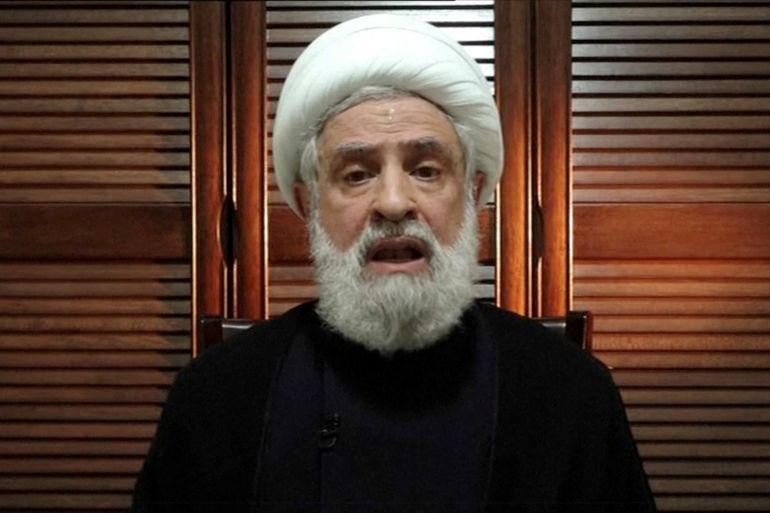Hezbollah’s deputy chief delivers defiant message
Sheikh Naim Qassem asserts that despite death of leader, Hezbollah remains militarily capable and ready to meet any Israeli ground offensive.
Lebanon’s Hezbollah deputy leader Sheikh Naim Qassem delivers an address from an unknown location, September 30, 2024, in a still image from video from al-Manar TV/Reuters TV (Reuters)Published On 30 Sep 202430 Sep 2024
Hezbollah’s deputy chief has pledged that the Lebanese armed group is ready to meet an Israeli ground offensive, despite the deaths of its leader and many senior commanders.
Israel has not hit Hezbollah’s military capabilities, said Sheikh Naim Qassem on Monday as he delivered a message of defiance in a public address. Despite the setbacks suffered during the bombardment of Lebanon in recent days, he insisted that the Iran-linked armed group will continue to fight.
Hezbollah’s operations have continued at the same pace and more since the killing of leader Hassan Nasrallah on Friday, Qassem asserted.
He added that Hezbollah will install a new leadership soon via “internal mechanisms”. The choice of new leadership is clear, Qassem continued, without offering further details.
“We are quite ready, if the Israelis want a ground incursion, the resistance forces are ready for that,” he declared.
Hezbollah will continue with its main goals despite Israel’s aim of creating chaos with aggression and massacres against civilians in Lebanon, Qassem continued.
“Israel is committing massacres in all areas of Lebanon until there is no house left without traces of Israeli aggression in it,” he said. “Israel attacks civilians, ambulances, children and the elderly. It does not fight fighters, but rather commits massacres.”
Qassem also underlined the role of the US, which he called “a partner with Israel, through unlimited military support – culturally, politically, financially”.
“We will win, just as we won in our confrontation with Israel in 2006,” said the deputy chief as he ended the video message.
Al Jazeera’s Zeina Khodr, said Qassem’s message was intended to also reassure the Lebanese Shia population who feel abandoned after loosing not just their leader, but also a father figure who they trusted.
“He was trying to reassure his people that Hezbollah still has the military capabilities to fight, telling Israel it’s not ready to surrender,” Khodr said.
Yet, Khodr noted, the group needs to regroup after a wave of Israel-led assassinations in the past weeks has decimated its leadership, including its leader Hassan Nasrallah. It will also have to asses how to create some sort of deterrence and use its arsenal of weapons – including long-range missiles – against a military power who has already inflected great damage to the Lebanese population.
“The question is, if they do that and hit population centers in Israel what kind of response will there be from Israel – carpet bombing?,” Khodr said.
More than a 1000 people have been killed in the past two weeks in a wave of ferocious Israeli attacks mostly on southern and eastern Lebanon. The dramatic escalation has started since Israel shifted its focus from fighting in Gaza to its northern frontier where it traded nearly daily cross fire with Hezbollah since the start of the war in Gaza. Israel’s stated aimed in its offensive into Lebanon is allowing the return of tens of thousands of Israeli civilians to their homes in the country’s north.
For the first time since stepping up its attacks on Lebanon, Israel on Monday struck a central area of the capital Beirut signalling further potential escalation towards an all-out war.
Wary
Hezbollah’s insistence that it can defend Lebanon was supported by backer Iran, which appears wary of the risk of wider regional war that any direct confrontation with Israel would carry.
Tehran will not deploy forces to Lebanon or Gaza to confront Israel, its foreign ministry said on Monday, despite Israel’s bombardments of both.
“There is no need to send extra or volunteer forces of the Islamic Republic of Iran,” said foreign ministry spokesman Nasser Kanani, adding that Lebanon and fighters in the Palestinian territories “have the capability and strength to defend themselves against the aggression.”
However, with signs building of a likely Israeli ground offensive, Lebanon’s caretaker prime minister, Najib Azmi Mikati, said on Monday in a news conference that, while still committed to an immediate ceasefire, the government is prepared to deploy the army in the south of the country.
